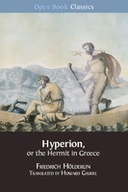Explore
"Friedrich Hölderlin’s only novel, Hyperion (1797–99), is a fictional epistolary autobiography that juxtaposes narration with critical reflection. Returning to Greece after German exile, following his part in the abortive uprising against the occupying Turks (1770), and his failure as both a lover and a revolutionary, Hyperion assumes a hermitic existence, during which he writes his letters. Confronting and commenting on his own past, with all its joy and grief, the narrator undergoes a transformation that culminates in the realisation of his true vocation.
Though Hölderlin is now established as a great lyric poet, recognition of his novel as a supreme achievement of European Romanticism has been belated in the Anglophone world. Incorporating the aesthetic evangelism that is a characteristic feature of the age, Hyperion preaches a message of redemption through beauty. The resolution of the contradictions and antinomies raised in the novel is found in the act of articulation itself. To a degree remarkable in a prose work of any length, what it means is inseparable from how it means. In this skilful translation, Gaskill conveys the beautiful music and rhythms of Hölderlin’s language to an English-speaking reader."
This book is included in DOAB.
Why read this book? Have your say.
You must be logged in to comment.
Rights Information
Are you the author or publisher of this work? If so, you can claim it as yours by registering as an Unglue.it rights holder.Downloads
This work has been downloaded 272 times via unglue.it ebook links.
- 272 - pdf (CC BY) at OAPEN Library.
Keywords
- Classic fiction (pre c 1945)
- European Romanticism
- Fiction & related items
- fictional epistolary autobiography
- Friedrich Hölderlin
- Hyperion
- Literature & literary studies
- Myth & legend told as fiction
- Novel
- thema EDItEUR::D Biography, Literature and Literary studies
- thema EDItEUR::F Fiction and Related items::FB Fiction: general and literary::FBC Classic fiction: general and literary
- thema EDItEUR::F Fiction and Related items::FN Fiction: Traditional stories, myths and fairy tales
Links
DOI: 10.11647/OBP.0160Editions

